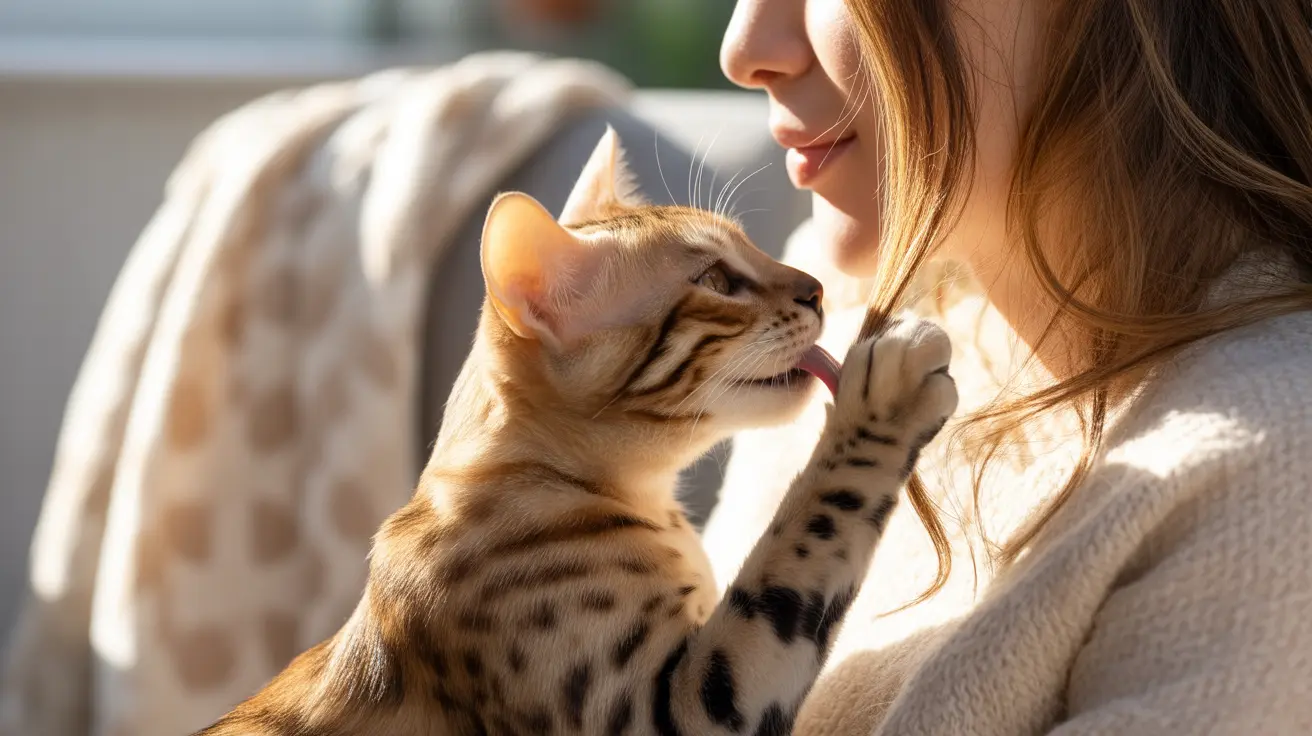The Social Significance of Hair Licking
When your cat licks your hair, they're engaging in a behavior called "allogrooming" - the social grooming that cats typically reserve for their closest family members. This isn't just about hygiene; it's a powerful social bonding mechanism.
In feline colonies, cats groom each other to strengthen their social bonds and create a group scent. When your cat licks your hair, they're essentially treating you as a member of their family group, showing both trust and affection.
Natural Instincts and Maternal Behavior
Many cats develop this behavior as an extension of their kittenhood experiences. Mother cats groom their kittens not only to clean them but also to provide comfort and security. Your cat may be recreating this nurturing behavior with you, especially if they were separated from their mother at an early age.
This grooming behavior often comes with other signs of contentment, such as purring or kneading, which further reinforces its connection to maternal care and comfort.
Marking Territory and Claiming You
Cats are territorial creatures, and licking is one way they mark their territory. Your hair provides an excellent surface for them to deposit their scent, effectively claiming you as their own. This behavior helps them feel more secure in their environment and strengthens their connection to you.
When your cat licks your hair, they're also trying to make you smell more like them, which in their world is a sign of belonging to the same social group.
Health and Behavioral Considerations
While hair licking is generally harmless, there are some situations where it might indicate underlying issues. Excessive licking could signal anxiety or stress, especially if accompanied by other behavioral changes. Additionally, cats who frequently ingest human hair might be at risk for hairballs or digestive issues.
If your cat's licking becomes compulsive or seems stress-related, it's worth consulting with your veterinarian to rule out any health concerns.
Managing Your Cat's Hair-Licking Behavior
If you'd prefer to discourage this behavior, there are several effective strategies you can employ. Gentle redirection, providing alternative forms of attention, and using cat-safe deterrent sprays can help modify this behavior without damaging your bond.
Remember that this is typically a sign of affection, so any correction should be done with patience and understanding.
Frequently Asked Questions
Why does my cat lick my hair, and is it normal behavior?
Yes, it's completely normal behavior. Cats lick human hair as a form of social bonding, showing affection, and marking you as part of their family group. This behavior mirrors how cats interact with other cats they trust and care about.
What does it mean when my cat licks my hair—is it a sign of affection, marking territory, or something else?
It's typically a combination of both affection and territorial marking. Your cat is showing they trust you, consider you family, and want to mark you with their scent while removing unfamiliar odors from your hair.
Should I be concerned if my cat licks or chews my hair too much, and can it cause any health problems?
Excessive licking or chewing could indicate anxiety or stress. It might also lead to hairballs if your cat ingests too much hair. If the behavior becomes compulsive, consult your veterinarian.
How can I stop my cat from licking my hair if I don't like it or it becomes excessive?
You can gently discourage the behavior by moving away when it occurs, providing alternative forms of attention, and increasing playtime. Never punish your cat, as this could damage your relationship.
Are there any products, like citrus-scented shampoos, that can deter cats from licking human hair?
Yes, citrus-scented hair products can help deter cats since they typically dislike citrus smells. However, ensure any products used are safe for both you and your cat, and consult with your veterinarian if unsure.
Conclusion
Your cat licking your hair is typically a positive sign that reflects trust, affection, and a strong social bond. While it might seem unusual to us, it's a natural behavior that's deeply rooted in feline social structures and maternal care. Understanding this behavior can help you better appreciate your cat's way of showing love and strengthen your relationship with them.






